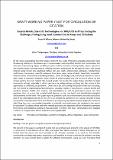| dc.description.abstract | Of the many catastrophes that the African continent has faced, HIV/AIDS is grouped among the most
threatening cataclysms. The disease and its repercussions not only affect families and communities, but
also have a devastating impact on different sectors of the economy including health, labour, education
and security issues. Immense human suffering has been experienced for the past 25 years, with young
children being forced into adulthood before they are ready, among other upheavals. Amidst these
misfortunes, tremendous scientific advances have been made; some of which have fairly succeeded,
whereas others have had heart-breaking setbacks. Given this background, it would be relevant to raise a
wide range of questions especially those aimed at understanding why the myriad of efforts by the
various parties have not realized the desired results. To do this, this paper draws attention to local
community settings, especially in Africa, and focus on village set-ups, probing into the nature of the
approaches to combating the pandemic. Given the issues surrounding the spread of the virus including,
but not limited to stigmatization/discrimination, sexuality, modes of transmission, cultural beliefs and
practices, trauma, health care services, aid organizations as well as governance issues, we raise
questions that cut across the societal belief terrains on the one hand, and scientific/technological
advancements on the other. This paper explores questions such as: to what extent are cultural practices
part of the unbreakable barriers in the efforts to combat the pandemic? Are cultural contexts of local
communities misunderstood? How can a focus on participatory approaches and not diagnostic measures
help? How best can a sustainable integration of scientific and social aspects be achieved in the search
for solutions? To address these and other related questions, the argument will be informed by examples
from Kenya and Zimbabwe, looking at how particular ‘scientific’ and ‘local’ communities have engaged
in efforts to integrate their efforts towards combating HIV/AIDS. | en_US |

